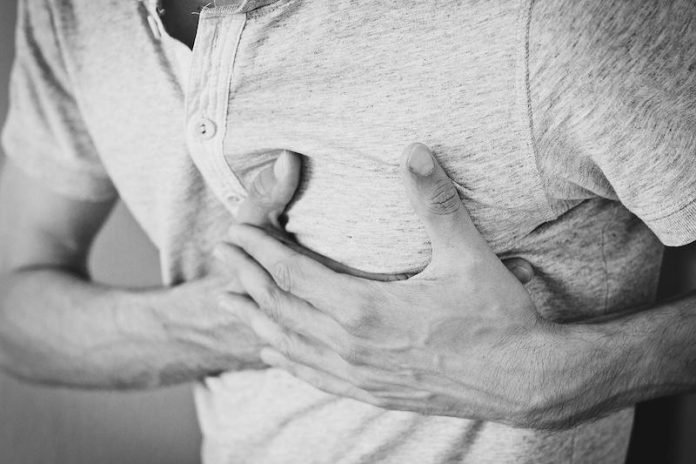
Ventricular fibrillation (v-fib) causes most cardiac arrests. V-fib is a type of arrhythmia.
During v-fib, the ventricles (the heart’s lower chambers) don’t beat normally. Instead, they quiver very rapidly and irregularly.
When this happens, the heart pumps little or no blood to the body. V-fib is fatal if not treated within a few minutes.
Other problems with the heart’s electrical system also can cause cardiac arrest. For example, cardiac arrest can occur if the rate of the heart’s electrical signals becomes very slow and stops.
Cardiac arrest also can occur if the heart muscle doesn’t respond to the heart’s electrical signals.
Certain diseases and conditions can cause the electrical problems that lead to cardiac arrest.
Examples include coronary heart disease, also called coronary artery disease; severe physical stress; certain inherited disorders; and structural changes in the heart.
Coronary heart disease
Coronary heart disease is a disease in which a waxy substance called plaque builds up in the coronary arteries. These arteries supply oxygen-rich blood to your heart muscle.
Plaque narrows the arteries and reduces blood flow to your heart muscle. Eventually, an area of plaque can rupture (break open). This may cause a blood clot to form on the plaque’s surface.
A blood clot can partly or fully block the flow of oxygen-rich blood to the portion of heart muscle fed by the artery. This causes a heart attack.
During a heart attack, some heart muscle cells die and are replaced with scar tissue. The scar tissue damages the heart’s electrical system.
As a result, electrical signals may spread abnormally throughout the heart. These changes to the heart increase the risk of dangerous arrhythmias and cardiac arrest.
Coronary heart disease seems to cause most cases of cardiac arrest in adults. Many of these adults, however, have no symptoms of heart disease before having cardiac arrest.
Physical stress
Certain types of physical stress can cause your heart’s electrical system to fail.
Intense physical activity: The hormone adrenaline is released during intense physical activity. This hormone can trigger cardiac arrest in people who have heart problems.
Very low blood levels of potassium or magnesium: These minerals play an important role in your heart’s electrical signaling.
Major blood loss
Severe lack of oxygen
Inherited disorders
A tendency to have arrhythmias runs in some families. This tendency is inherited, which means it’s passed from parents to children through the genes. Members of these families may be at higher risk for cardiac arrest.
An example of an inherited disorder that makes you more likely to have arrhythmias is long QT syndrome (LQTS). LQTS is a disorder of the heart’s electrical activity.
Problems with tiny pores on the surface of heart muscle cells cause the disorder. LQTS can cause sudden, uncontrollable, dangerous heart rhythms.
People who inherit structural heart problems also may be at higher risk for cardiac arrest. These types of problems often are the cause of cardiac arrest in children.
Structural changes in the heart
Changes in the heart’s normal size or structure may affect its electrical system.
Examples of such changes include an enlarged heart due to high blood pressure or advanced heart disease. Heart infections also may cause structural changes in the heart.
If you care about heart health, please read studies about common cause of heart disease, diabetes, high blood pressure, and this drug may prevent respiratory and heart damage in COVID-19.
For more information about heart health, please see recent studies that fat in milk and cheese may lower the risk of heart disease, and results showing fitness didn’t keep him from heart problems or COVID-19, but it did help him recover.



